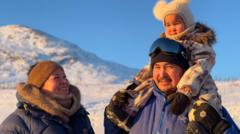Traveling through the icy fjords near Nuuk, the capital, it is clear that Greenlandic culture and identity are at stake. Locals express their staunch belief that “Greenland belongs to Greenlanders,” rejecting any notion of the territory being up for sale. Elder Kaaleeraq Ringsted, a great-grandfather, emphasized the importance of preserving their heritage for the younger generations, stating unequivocally, "Greenland is not for sale."
Life in this remote part of the world is shaped by its harsh climate. Farmers like Angutimmarik Hansen, who combines sheep farming with hunting, jokingly reference the need for defenses against potential invasions but hold firm in their commitment to their homeland. The arrival of Donald Trump Jr. in Nuuk only intensified these feelings as he acknowledged the desire for trade and cooperation while maintaining a lighthearted demeanor around contentious political matters.
Political leaders, such as Kuno Fencker, express hope that this international spotlight could allow Greenland to negotiate directly with the U.S. rather than through Denmark. However, concerns linger about what independence from Denmark might cost, given the significant financial support the island currently receives.
Media discourse further complicates the situation, as leading figures urge a broader conversation—not solely reduced to independence or dependence—balancing economic sustenance with the desire for self-determination. Greenland's Prime Minister, Mute Egede, rebuffed the sell-off sentiments, underscoring the community's aspiration to establish its identity free from foreign dominance.
Conversations about past injustices from colonial times are also resurfacing, reflecting a broader desire among individuals like former finance minister Maliina Abelsen for acknowledgment and healing before pursuing independence. The ongoing dialogue about Greenland’s future is framed increasingly against the backdrop of Trump’s controversial statements, making it a critical time for Greenland to define its own destiny.
With the world watching, the voices from both remote villages and urban centers in Greenland illustrate a collective resolution: their fate will be determined by the Greenlanders themselves.
Life in this remote part of the world is shaped by its harsh climate. Farmers like Angutimmarik Hansen, who combines sheep farming with hunting, jokingly reference the need for defenses against potential invasions but hold firm in their commitment to their homeland. The arrival of Donald Trump Jr. in Nuuk only intensified these feelings as he acknowledged the desire for trade and cooperation while maintaining a lighthearted demeanor around contentious political matters.
Political leaders, such as Kuno Fencker, express hope that this international spotlight could allow Greenland to negotiate directly with the U.S. rather than through Denmark. However, concerns linger about what independence from Denmark might cost, given the significant financial support the island currently receives.
Media discourse further complicates the situation, as leading figures urge a broader conversation—not solely reduced to independence or dependence—balancing economic sustenance with the desire for self-determination. Greenland's Prime Minister, Mute Egede, rebuffed the sell-off sentiments, underscoring the community's aspiration to establish its identity free from foreign dominance.
Conversations about past injustices from colonial times are also resurfacing, reflecting a broader desire among individuals like former finance minister Maliina Abelsen for acknowledgment and healing before pursuing independence. The ongoing dialogue about Greenland’s future is framed increasingly against the backdrop of Trump’s controversial statements, making it a critical time for Greenland to define its own destiny.
With the world watching, the voices from both remote villages and urban centers in Greenland illustrate a collective resolution: their fate will be determined by the Greenlanders themselves.


















